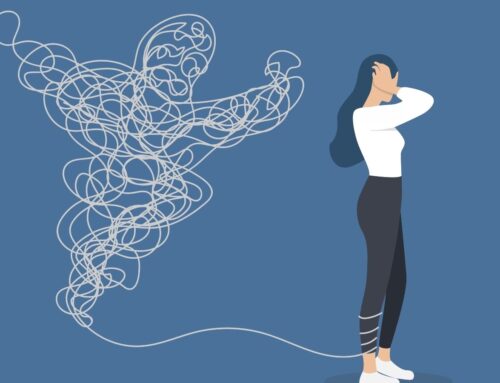By Emma Sacks, college intern, and Dr. Divya Babbar
Does going to class feel like putting on a mask? Do you get straight As but feel you’re one class from flunking out?
Imposter Syndrome (IS) is characterized by persistent self-doubt concerning one’s work, intelligence, and accomplishments. Burnout, low self-esteem, anxiety, and depression are common features associated with Imposter Syndrome.
Who has Imposter Syndrome?
Those who experience Imposter Syndrome are far from fraudulent. Instead, they are often the high achievers among us — with obvious evidence of their skills and capabilities. So, if you feel like an imposter, know that those around you likely consider you to be the very picture of success.
Imposter Syndrome is most prevalent among women –– especially women of color. This is because women have the experience of facing immense scrutiny and evaluation in society. For members of historically underrepresented and marginalized groups, IS is often related to stereotype threat — where the perception that others have a stereotypical view of them impacts performance negatively. Having said that, anyone in a high-achieving or high-demand role can experience IS.
What does Imposter Syndrome look like?
I’m glad you asked. There are a few patterns commonly observed among those with this phenomenon.
- Despite evidence of success, those with IS commonly set nearly impossible to reach self-imposed standards and goals to prove to themselves and their peers that they belong. They often feel a constant pressure to work harder or accomplish more, which can create a tendency to over-prepare for work or school-related tasks. Simultaneously, if they are unable to achieve these goals, they may feel fraudulent.
- Fear of failure. Those with IS fear being shamed or humiliated if they do not perform well on any tasks and may experience performance anxiety. These fears are heightened when individuals tether their performance on the task at hand to success.
- Questioning of competence and capability. Those with IS show a pattern of thinking one is not good enough. Successes are attributed to external factors and unrelated to one’s own skill. E.g., “It was an easy assignment.” or “I just got lucky.”
- Fear of success. How could one fear success if they fear failure? This is related to high self-doubt and low self-esteem, both common for those with IS. Success can be scary when you aren’t confident that you have the skills to succeed or are afraid that if you succeed once, i.e., get the promotion, you won’t be able to maintain your success.
Do any of these sound like you or someone you know? Here are a few skills and ways to recognize that you do belong.
Recognize your achievements. Use self-reflection and gratitude to consciously attribute your success to you and your skills. Did you study for that test? Then the good mark you received was due to your studying, not because the test was easy. It can sometimes be helpful to make a list of your concrete accomplishments and the skills that helped you achieve them.
Share how you’re feeling. Talk to someone! Preferably outside of the context where you feel like an imposter. This can be friends, family, loved ones, or mentors. Positive affirmation from someone who knows you and your success can offer validation when we feel incapable.
Embrace imperfection! Perfection is more elusive than it is unhelpful. If we can learn to tolerate minor imperfections or mistakes, this will greatly reduce the fear we experience when reaching for success.
Counseling or psychotherapy. Consider seeking professional counseling or psychotherapy. A mental health provider can help you understand why you feel like an imposter and help you improve these feelings and your experience.
One instance of lower performance does not make you a failure. We don’t suddenly become unsuccessful with one bad grade or missed promotion. If we learn to view challenge as an invitation for accomplishment rather than a threat of failure, we can be less frightened by uncertainty and more confident in our capabilities. If you still feel like an imposter; unsure that you deserve to be here — please remember that unless you are using an alias and have some secret identity, chances are that you 100% belong.
If you’re feeling at a loss this school year and feel like you would like to speak to someone, Georgetown Psychology has therapists ready to provide support and help you navigate the challenges of feeling a sense of belonging.
Here is a list of recommended books related to Imposter Syndrome if you would like further reading:
- “Own Your Greatness” by Lisa Orbé-Austin, PhD and Richard Orbé-Austin, PhD
- “The Imposter Syndrome Workbook: Exercises to Boost Your Confidence, Own Your Success, and Embrace Your Brilliance” by Athina Danilo, LMFT
- “The Secret Thoughts of Successful Women” by Valerie Young, PhD






